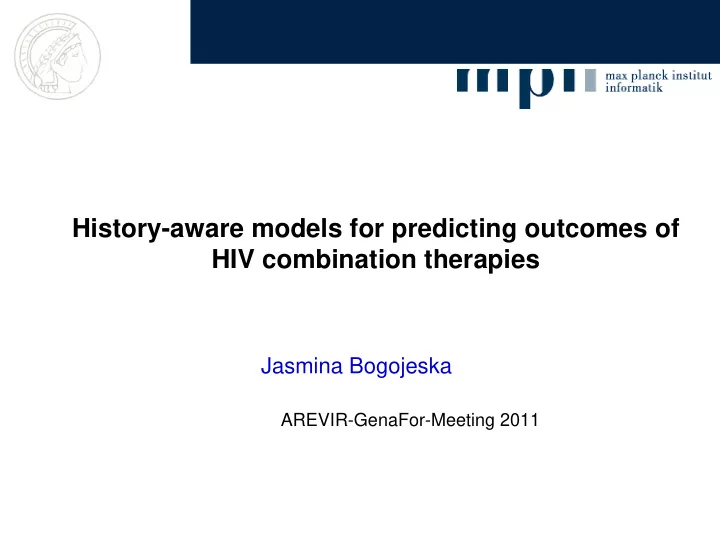

History-aware models for predicting outcomes of HIV combination therapies Jasmina Bogojeska AREVIR-GenaFor-Meeting 2011
Problem setting Prediction of the outcome of combination therapies given to HIV patients Develop methods that can deal with: Different trends in treating patients Uneven therapy representation Current therapy Level of therapy experience
Data occurrence of Viral genotype 0 1 0 0 1 … resistance mutations drugs used in Current treatment 1 0 0 1 0 … current treatment drugs used in all Treatment history 1 1 0 0 1 … previous treatments 1 or -1 Label (success or failure) 6336 labeled samples with different 638 combination therapies
Treatment history-aware model Problems in the available HIV data: Only dominant strain sequenced- no information on latent virus population Uneven sample representation regarding level of therapy experience Idea: use treatment history information Extract knowledge on latent virus population Balance the data regarding level of therapy experience How? Quantify similarity of treatment histories by using drug resistance mutations
Similarity of treatment history Treatment record ordered by therapy starting time => therapy sequence ( ) { | ( ) ( ) and ( ) ( )} r t z start z start t patient z patient t Desired properties Accounts for length of therapy history Order matters! Prediction targets current therapy Adapt sequence alignment methods to align therapy sequences!
Therapy sequence alignment Therapy sequence similarity Quantify pairwise therapy similarity Use drug resistance mutations
Treatment history-aware model Train a separate model for each therapy sequence by using knowledge from similar therapy sequences Sample weighted regularized logistic regression 1 T arg max ( ( ), ( )) ( ( , , , ), ) S r z r t l f x z h w y w w i i i i t i t t | | D w t ( , , , ) x z h y D i i i i seq similarity loss function
Time-oriented evaluation scenario Special evaluation setup to address evolving trends in treatments over time 80% training 20% test
Results AUC performance stratified for the level of therapy experience
AUC performance stratified for the therapy abundance Results
Results
Conclusions Information extracted from treatment history enhances the performance for samples originating from both therapy-experienced patients and rare therapies Balance the uneven therapy-history representation in clinical data Time-aware evaluation setup to encounter changing trends in HIV treatment over time
Acknowledgements Thomas Lengauer HIV group @ MPII Saarbrucken Joachim Büch Rolf Kaiser & Group
Thank You!
Results
Recommend
More recommend